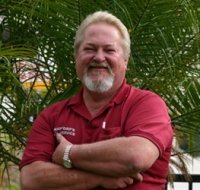The Basics Behind The 12 Volt DC System In Your RV
The electrical systems in your RV can be broken up into two categories: your 12 volt DC system and your 110/120 volt AC system. Your 12 volt DC system are run by your RV's batteries, and we'll take a closer look at it below. (To learn more about your 110/120 volt AC system, go to the RV electrical systems page.)AC? DC?
The AC and DC you see referenced above are the same AC and DC the 70s/80s Australian super band AC/DC takes its name from.
AC stands for alternating current, referring to an electrical charge that changes direction. DC, on the other hand, stands for direct current and involves a flow of charge in only one direction.
AC/DC chose the moniker because of the raw, electric energy they brought to their music. Fitting, eh?
In today's RVs everything relies on 12-volt batteries to function--everything from the roof air conditioner to the refrigerator. Once the roof air conditioner or the refrigerator are turned on they run on 110/120 volt, but it's the 12-volt that powers the computer that starts them up.
In addition, your water heater and your furnace are also all 12-volt computer operated.
The biggest key to keeping your 12 volt DC system working is keeping your batteries charged. There are four effective methods used to keep your batteries charged and in working order: hookups, your engine, your generator and solar power. We'll look at each individually below:
Hookups
Hookups are a great way to charge your batteries if you have the option available to you. When you plug your RV in, your converter should automatically be charging your batteries.
If, however, you are plugged in and still have problems with your batteries being charged check your battery monitor. If the monitor shows that your batteries are not being charged you have a problem with your converter or battery system. ***
Engine
When your engine is running your engine battery and house batteries are being charged. But using the engine for the sole purpose of charging your house batteries is not very practical (a deep cycle battery that is low requires 72 hours of charging) and I don't recommend it.
That said, running the engine to get emergency 12 volt if you're in a pinch is fine (to run the furnace if you're cold at night/and you have no generator or can't use it, for instance). Other than that though, this is a method of charging that will just happen naturally as you run the engine.
Generator
You RV generator does not directly charge your batteries, however it does supply power to your converter, which will in turn charge your batteries.
Solar Power
Solar power is a very efficient and environmentally friendly option to ensure your 12-volt battery system is always charged. For more information on solar power and why should consider making it a source of energy in your RV you can visit our solar panels page. That page lays out the pros and cons as well as the reasoning behind why I think every RV owner should have RV solar panels.
Enjoy this page? Please help us pay it forward to others who would find it valuable by Liking, Sharing, Tweeting, Stumbling, and/or Voting below.
Have a question about this topic?
Have a question about your RV? Chat with an expert one-on-one now.*
*Chat provided by JustAnswer.com, a third party not affiliated with MSRVR
Where To Go From Here
Kind Words From Our Visitors

Hi, I'm Robbie. Welcome to Money-Saving-RV-Repair.com!
Like the name implies, this site is all about helping you save money while keeping your RV in tip-top shape--and that is all about you having the knowledge to do so.
I've been a technician in the RV industry for 30 years, operating out of San Diego, California. And let me tell you, I love my job.
But I also love empowering RVers with the knowledge they need to make the right decision on repairs, or to make the fix themselves--and that, my friend, is the reason for this website. I hope you enjoy.
Or, learn more about me, my RV service practice, & this website here.


